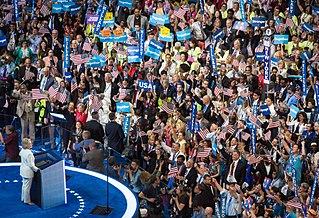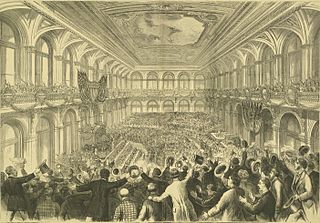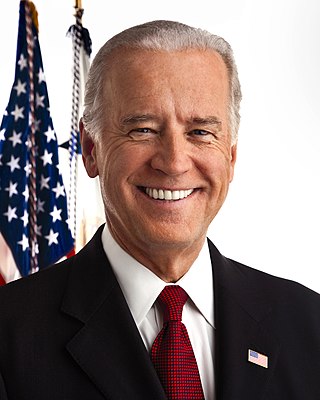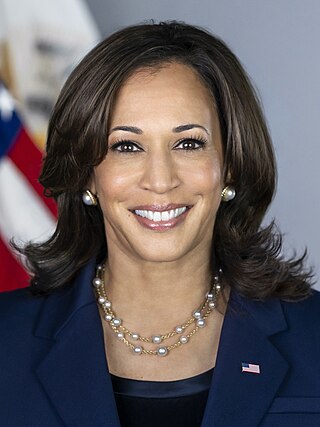A running mate is a person running together with another person on a joint ticket during an election. The term is most often used in reference to the person in the subordinate position but can also properly be used when referring to both candidates, such as by saying Joe Biden and Kamala Harris, and Uhuru Kenyatta and William Ruto, were running mates in relation to the presidential elections held in the United States in 2020 and Kenya in 2013 respectively.

The Democratic National Convention (DNC) is a series of presidential nominating conventions held every four years since 1832 by the United States Democratic Party. They have been administered by the Democratic National Committee since the 1852 national convention. The primary goal of the Democratic National Convention is to officially nominate a candidate for president and vice president, adopt a comprehensive party platform, and unify the party. Pledged delegates from all fifty U.S. states, the District of Columbia, and the American territories, and superdelegates which are unpledged delegates representing the Democratic establishment, attend the convention and cast their votes to choose the party's presidential candidate. Like the Republican National Convention, the Democratic National Convention marks the formal end of the primary election period and the start of the general election season. Since the 1980s, national conventions have become mostly inaugural events for the winning candidate, since winners are announced long before the convention. In 2020, both major parties, and many minor parties, replaced their usual in-person conventions with virtual programs due to the COVID-19 pandemic.

A United States presidential nominating convention is a political convention held every four years in the United States by most of the political parties who will be fielding nominees in the upcoming U.S. presidential election. The formal purpose of such a convention is to select the party's nominees for popular election as President and Vice President, as well as to adopt a statement of party principles and goals known as the party platform and adopt the rules for the party's activities, including the presidential nominating process for the next election cycle. Presidential nominating conventions are generally held in a different city every four years. With 26, Chicago has hosted the most major party conventions, beginning with Abraham Lincoln's nomination in 1860.
A candidate, or nominee, is the prospective recipient of an award or honor, or a person seeking or being considered for some kind of position; for example:
In United States politics and government, the term presidential nominee has two different meanings:
- A candidate for president of the United States who has been selected by the delegates of a political party at the party's national convention to be that party's official candidate for the presidency.
- A person nominated by a sitting U.S. president to an executive or judicial post, subject to the advice and consent of the Senate.
Vetting is the process of performing a background check on someone before offering them employment, conferring an award, or doing fact-checking prior to making any decision. In addition, in intelligence gathering, assets are vetted to determine their usefulness.
In a governmental system, a party leader acts as the official representative of their political party, either to a legislature or to the electorate. Depending on the country, the individual colloquially referred to as the "leader" of a political party may officially be party chair, secretary, or the highest political office.

This article lists potential candidates for the Democratic nomination for Vice President of the United States in the 2008 presidential election. After Illinois Junior Senator Barack Obama became the Democratic Party's presumptive presidential nominee on June 3, 2008, Obama formed a small committee, made up of James A. Johnson, Eric Holder and Caroline Kennedy, to help him select a running mate. Veteran Democratic lawyer and advisor James "Jim" Hamilton, of the firm Morgan, Lewis & Bockius, later replaced Johnson in vetting candidates.

The election of the president and the vice president of the United States is an indirect election in which citizens of the United States who are registered to vote in one of the fifty U.S. states or in Washington, D.C., cast ballots not directly for those offices, but instead for members of the Electoral College. These electors then cast direct votes, known as electoral votes, for president, and for vice president. The candidate who receives an absolute majority of electoral votes is then elected to that office. If no candidate receives an absolute majority of the votes for president, the House of Representatives elects the president; likewise if no one receives an absolute majority of the votes for vice president, then the Senate elects the vice president.
The 2012 Libertarian National Convention, in which delegates of the Libertarian Party (LP) chose the party's nominees for president and vice president in the 2012 general election, was held May 2–6, 2012, in Las Vegas, Nevada, at the Red Rock Resort Spa and Casino. Former Governor of New Mexico Gary Johnson won the presidential nomination on the first ballot. Retired California state court judge Jim Gray won the vice presidential nomination, also on the first ballot. The convention also chose to replace most of the Libertarian National Committee party officers and members-at-large.

On May 29, 2012, former Governor Mitt Romney of Massachusetts won the 2012 nomination by the Republican Party for President of the United States, and became the presumptive nominee of the party. On August 11, 2012, Romney officially announced his selection of Wisconsin Representative Paul Ryan as his running mate to supporters via an iPhone app, though the selection of Ryan had already leaked to the press hours before the official announcement. Ryan was the first individual from Wisconsin to appear on a national ticket of a major party as a nominee either for President or Vice President of the United States, although third-party presidential candidate Robert M. La Follette won 16% of the popular vote in the 1924 election. The Romney–Ryan ticket ultimately lost to the Obama–Biden ticket in the 2012 presidential election.

The 2016 Green National Convention, in which delegates of the Green Party of the United States chose the party's nominees for president and vice president in the national election, was held August 4–7, 2016 in Houston, Texas. In August 2015, Houston was chosen over a competing proposal from Toledo, Ohio. The convention was located at the University of Houston with the theme, "Houston, We Have A Solution: Vote Green 2016". The convention formally nominated Jill Stein as the party's presidential nominee and Ajamu Baraka as her running mate.

The 2014 Puntland presidential election was held on 8 January 2014 in Garowe, the administrative capital of the autonomous Puntland region in northeastern Somalia. The third such vote to be held in the state since its formation in 1998, it followed the election of a new Parliament Speaker and Deputy Speakers on 4 January 2014 by the 66-seat regional legislature. Candidates included officials from the incumbent Puntland administration, former government ministers and prominent local entrepreneurs. The ballot saw the election of former prime minister of Somalia Abdiweli Gaas as the fifth president of Puntland, narrowly defeating the incumbent Abdirahman Farole. Parliament of Puntland concurrently elected Abdihakim Abdullahi Haji Omar as Puntland's new vice president in place of Abdisamad Ali Shire.

This article lists those who were potential candidates for the Democratic nomination for Vice President of the United States in the 2000 election. Incumbent Vice President Al Gore won the 2000 Democratic nomination for President of the United States, and chose Connecticut Senator Joseph Lieberman as his running mate on August 7, 2000. Lieberman, a centrist two-term Democratic senator, was chosen for being "tough on defense" and foreign policy issues. Lieberman was the first Jewish nominee chosen for a national ticket. The choice of Lieberman was announced shortly before the 2000 Democratic National Convention. Former Secretary of State Warren Christopher led the vetting process. The Gore–Lieberman ticket ultimately lost to the Bush–Cheney ticket in the general election. Coincidental to the presidential election, Lieberman was re-elected to a third term as senator from Connecticut.

Businessman Donald Trump of New York, the 2016 Republican nominee for President of the United States, considered several prominent Republicans and other individuals before selecting Governor Mike Pence of Indiana as his running mate on July 15, 2016. Pence formally won the vice presidential nomination at the 2016 Republican National Convention on July 19. The Trump–Pence ticket would go on to defeat the Clinton–Kaine ticket in the 2016 presidential election but ultimately lost to the Biden–Harris ticket in 2020.

This article lists potential candidates for the Democratic nomination for Vice President of the United States in the 2016 election. Former Secretary of State Hillary Clinton, the 2016 Democratic nominee for President of the United States, chose Senator Tim Kaine of Virginia as her running mate. The formal nomination took place at the 2016 Democratic National Convention. The Clinton–Kaine ticket ultimately lost to the Trump–Pence ticket in the general election, and Kaine returned to the Senate following the campaign.

This article lists third-party and independent candidates, also jointly known as minor candidates, associated with the 2020 United States presidential election.

The 2020 Libertarian National Convention delegates selected the Libertarian Party nominees for president and vice president in the 2020 United States presidential election. Primaries were held, but were preferential in nature and did not determine delegate allocation. The convention was originally scheduled to be held from May 21 to May 25 at the JW Marriott Austin luxury hotel in downtown Austin, Texas. On April 26, all reservations at the JW Marriott Austin were canceled in response to the COVID-19 pandemic, leaving the convention oversight committee to seek another venue for a possible July date.

This article lists the candidates for the Democratic nomination for Vice President of the United States in the 2020 presidential election. Former Vice President Joe Biden of Delaware, the 2020 Democratic nominee for President of the United States, considered several prominent Democrats and other individuals before selecting Senator Kamala Harris of California as his running mate on August 11, 2020. Harris formally won the vice presidential nomination on August 19, 2020, at the 2020 Democratic National Convention. The Biden–Harris ticket would go on to defeat the Trump–Pence ticket in the general election.
Vice President Kamala Harris, the Democratic nominee for President of the United States in 2024, considered several prominent individuals before selecting Governor Tim Walz of Minnesota as her running mate on August 6. Harris and Walz were certified as the official nominees that evening by Democratic National Committee secretary Jason Rae. Walz is the first sitting governor selected as the Democratic vice presidential nominee since Charles W. Bryan of Nebraska in 1924 and if elected, would be the third vice president from Minnesota after Hubert Humphrey and Walter Mondale. Walz is also the first sitting governor to appear on the Democratic ticket since Bill Clinton in 1992.












